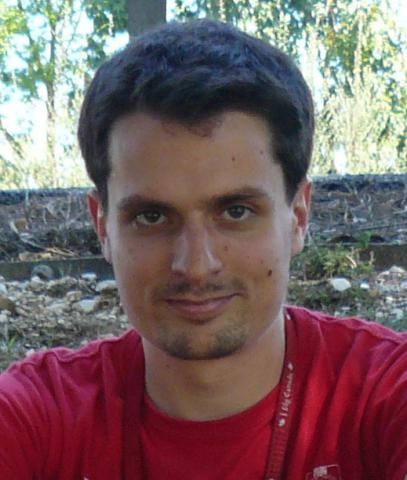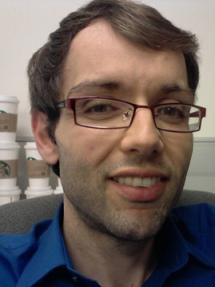9:00 - 9:15 Welcome and Introduction (Conference Room, 3rd Floor)
9:15 - 10:15 Invited talk by Rui Aguiar, “Management in Chaotic Telecommunication Environments".
Abstract: The upcoming 5G networks will have a large diversity of stakeholders. The talk will start by characterizing the expectable scenarios on future telecommunication environments, that will be based in a multitude of connection opportunities, across multiple technologies, from different providers - and many from end-users - and often in a virtualized environment. Some reflection on the current management models (and its close relationship with control) and its limitations will be used to highlight their inadequacy to this future environments, with the current "ownership" models becoming seriously outdated as novel technology gets deployed. Some potential promising techniques to address these new environments will be finally discussed.
 Bio: Rui L. Aguiar received his degree in telecommunication engineering in 1990 and his Ph.D. degree in electrical engineering in 2001 from the University of Aveiro. He is currently a Full Professor at the University of Aveiro, responsible for the networking area, and has been previously an adjunct professor at the INI, Carnegie Mellon University. He is a Visiting Research Scholar at Universidade Federal de Uberlândia, Brazil. He is coordinating a research line nationwide in Instituto de Telecomunicações, on the area of Networks and Multimedia. He is leading the Technological Platform on Connected Communities, a regional cross-disciplinary industry-oriented activity on smart environments.
Bio: Rui L. Aguiar received his degree in telecommunication engineering in 1990 and his Ph.D. degree in electrical engineering in 2001 from the University of Aveiro. He is currently a Full Professor at the University of Aveiro, responsible for the networking area, and has been previously an adjunct professor at the INI, Carnegie Mellon University. He is a Visiting Research Scholar at Universidade Federal de Uberlândia, Brazil. He is coordinating a research line nationwide in Instituto de Telecomunicações, on the area of Networks and Multimedia. He is leading the Technological Platform on Connected Communities, a regional cross-disciplinary industry-oriented activity on smart environments.His current research interests are centred on the implementation of advanced wireless networks and systems, with special emphasis on 5G networks and the Future Internet. He has more than 400 published papers in those areas, including standardization contributions to IEEE and IETF. He has served as technical and general chair of several conferences, from IEEE, ACM and IFIP, and is regularly invited for keynotes on 5G and Future Internet networks. He sits on the TPC of all major IEEE ComSoc conferences. He has extensive participation in national and international projects, of which the best example is his position as Chief Architect of the IST Daidalos project, and has extensive participation in industry technology transfer actions. He is currently associated with the 5G PPP Infrastructure Association and is the current Chair of the steering board of the Networld2020 ETP. He is a chartered engineer, senior member of IEEE, Portugal ComSoc Chapter Chair, and a member of ACM. He is associated editor of Wiley’s ETT, Springers’ Wireless Networks and of the recently launched Elsevier’s ICT Express.
10:15 - 10:45 Coffee break (Garden, Mezzanine - Entreplanta)
10:45 - 11:45 Invited talk by Daniel Romero, "Know your RF ambiance: cartographic techniques for spectrum-aware networking"
Abstract: Propelled by the explosive growth in traffic demands, next-generation wireless networks aggressively reuse radio resources across space through densification, typically by means of heterogeneous networks and device-to-device communications. To this end, intelligent interference control is required, which in turn necessitates accurate descriptors of the spectrum landscape. Other tasks demanding detailed RF situational awareness include dynamic spectrum access, network planning, as well as self-organized and autonomous networking. Unfortunately, inferring channel state information through traditional techniques entails prohibitive overhead, especially for the massive numbers of antennas and users expected in the upcoming years. To alleviate this bottleneck, spectrum cartography combines the measurements of spatially-distributed terminals to judiciously construct maps that characterize spectrum occupancy and point-to-point attenuation in a geographical region of interest. After outlining existing approaches for power spectral density cartography, the first part of the talk introduces techniques that minimize sensing complexity and bandwidth overhead while coping with the inherent variability of RF power across space and time. The second part deals with the construction of maps that provide the attenuation between each pair of spatial locations. To bypass the need of existing approaches to adopt heuristically selected models, a blind methodology capable of learning the characteristics of the propagation medium is presented.
 Bio: Daniel Romero received his M.Sc. and Ph.D. degrees in Signal Theory and Communications from the University of Vigo, Spain, in 2011 and 2015, respectively. From Jul. 2015 to Nov. 2016, he was a post-doctoral researcher with the Digital Technology Center and Department of Electrical and Computer Engineering, University of Minnesota, USA. In Dec. 2017, he joined the Department of Information and Communication Technology, University of Agder, Norway, as an associate professor. His main research interests lie in the areas of signal processing, communications, and machine learning.
Bio: Daniel Romero received his M.Sc. and Ph.D. degrees in Signal Theory and Communications from the University of Vigo, Spain, in 2011 and 2015, respectively. From Jul. 2015 to Nov. 2016, he was a post-doctoral researcher with the Digital Technology Center and Department of Electrical and Computer Engineering, University of Minnesota, USA. In Dec. 2017, he joined the Department of Information and Communication Technology, University of Agder, Norway, as an associate professor. His main research interests lie in the areas of signal processing, communications, and machine learning.
11:45 - 12:45 Invited talk by Antonio G. Marqués, "Stationary graph processes and applications to network topology inference"
Abstract: Advancing a holistic theory of networks necessitates fundamental breakthroughs in modeling, identification, and controllability of distributed network processes – often conceptualized as signals defined on the vertices of a graph. Under the assumption that the signal properties are related to the topology of the graph where they are supported, the goal of graph signal processing (GSP) is to develop algorithms that fruitfully leverage this relational structure. After a quick review of the fundamentals of GSP, the talk will have a twofold focus. We first generalize the concepts of stationarity and power spectral density (PSD) to signals defined in irregular graph domains, and discuss the implications in terms of PSD estimation. We then leverage the proposed definitions to address the problem of network topology inference from graph signal observations. It is assumed that the unknown graph encodes direct relationships between signal elements, which we aim to recover from observable indirect relationships generated by a diffusion process on the graph. Leveraging results from GSP and sparse recovery, efficient topology inference algorithms with theoretical guarantees are put forth. We also show that established methods that infer edge weights based on the correlation or partial correlation of the observed signals can be viewed as particular cases of our approach.
 Bio: Antonio G. Marqués received his B.Sc. and Ph.D. degrees in Electrical Engineering (with highest honors) from Carlos III University of Madrid, Spain, in 2002 and 2007 respectively. In 2007, he joined the Department of Signal Theory and Communications, King Juan Carlos University, Madrid, Spain, as an Associate Professor.
Bio: Antonio G. Marqués received his B.Sc. and Ph.D. degrees in Electrical Engineering (with highest honors) from Carlos III University of Madrid, Spain, in 2002 and 2007 respectively. In 2007, he joined the Department of Signal Theory and Communications, King Juan Carlos University, Madrid, Spain, as an Associate Professor.From 2005 to 2015 he visited (under different roles) the Department of Electrical Engineering at the University of Minnesota, USA. In 2015 and 2016 he was a Visiting Scholar at the Department of Electrical and Systems Engineering at the University of Pennsylvania, USA. The core of his research work is the application of adaptive (stochastic) signal processing and non-linear optimization, mostly duality theory and dynamic programming, to the fields of wireless networks, smart grids and network science. Nowadays, he has a growing interest in understating the relationship between signal processing and graph and network theory.
13:00 - 14:30 Lunch break (Garden, Mezzanine - Entreplanta)
14:30 - 17:00 Poster Session
- Linear Precoding for correlated sources in fading MIMO multiple access channels. P. Suárez-Casal, J.P. González-Coma, O. Fresnedo, L. Castedo (Univ. da Coruña)
- BER EXIT chart analysis for high-rate codes based on the parallel concatenation of RCM and LDGM codes. I. Granada, A. Saez, P. Crespo (CEIT), J. García-Frías (Univ. of Delaware)
- Implementation and evaluation of polar codes to achieve strong secrecy over the binary input symmetric degraded broadcast channel. J. del Olmo, J. Rodríguez-Fonollosa (UPC)
- Channel estimation and hybrid precoding/combining for frequency-selective multiuser mmWave systems. J. P. González-Coma (Univ. da Coruña), J. Rodríguez-Fernández (Univ. de Vigo), N. González-Prelcic (Univ. de Vigo), L. Castedo (Univ. da Coruña)
- Graph-signal reconstruction and blind deconvolution for structured inputs. D. Ramírez (Univ. Carlos III), A. G. Marqués (Univ. Rey Juan Carlos), S. Segarra (MIT)
- Low-complexity hybrid precoding based on atomic norm for massive MIMO. A. Vega, M. Sánchez-Fernández (Univ. Carlos III), A. Tulino, J. Llorca (Nokia Bell Labs)
- Millimeter-wave communication with out-of-band information. N. González-Prelcic (Univ. de Vigo), R. W. Heath (Univ. of Texas at Austin)
- Throughput-based performance evaluation of 5G-candidate waveforms in high speed scenarios. T. Domínguez-Bolaño, J. Rodríguez-Piñeiro, J.A. García-Naya, L. Castedo (Univ. da Coruña)
- Ranging Bias Estimation based on crowd sensing for improved tracking. E. Arias-de-Reyna (Univ. de Sevilla), D. Dardari (Univ. de Bologna), P. Closas (Northeastern Univ.), P. M. Djuric (Stony Brook Univ.)
- Exploting double polarization in mobile adaptive satellite links. A. Tato, C. Mosquera (Univ. de Vigo)
- Minimum-PER user-energy profile for massive SIC receivers under an average energy constraint. J. Sala-Alvarez, F. Rey, J. Villares, F. Molina (UPC)
- Exploiting common sparsity for frequency-domain estimation of mmWave frequency-selective channels. J. Rodríguez-Fernández, N. González-Prelcic (Univ. de Vigo), R. W. Heath (Univ. of Texas at Austin)
- Flexible Duplexing: Statistical Analysis with Interference Alignment under Imperfect CSI. J. Fanjul, I. Santamaría (Univ. Of Cantabria)
- Dimension spreading for coherent opportunistic communication. J. Borràs (UPC), J. Font-Segura (Univ. Pompeu Fabra), J. Riba (UPC), G. Vázquez (UPC)
- Crowdsource-based signal strength field estimation by gaussian processes. I. Santos, J. J. Murillo-Fuentes (Univ. de Sevilla), P. M. Djuric (Stony Brook Univ.)
- Joint beamforming and precoding for non-cooperative Earth stations. T. Ramírez, R. López-Valcarce, C. Mosquera (Univ. de Vigo)


